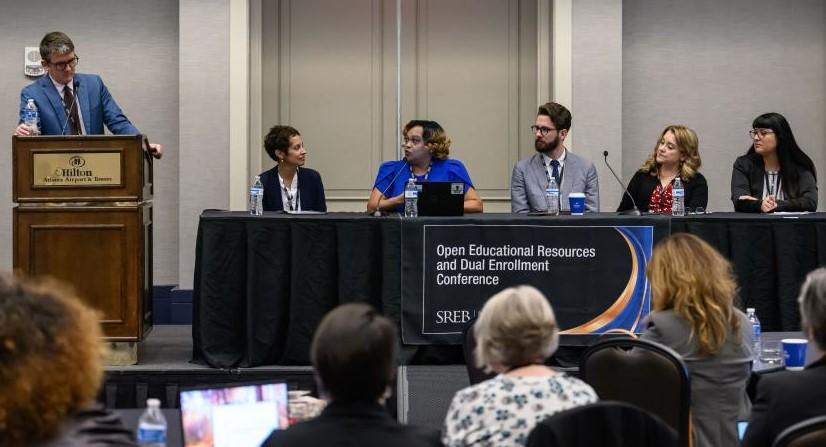Education leaders discuss challenges to open resources at 2nd OER conference
ATLANTA – Open educational resources could help increase the number of students who can afford and finish college, but the still-evolving practice will have to cross some regional and national hurdles first, a panel said here last week.
Speaking before an audience of more than 200 at the Southern Regional Education Board’s second conference on OER and dual enrollment, representatives from the nation’s four regional education compacts said one of the biggest challenges they face is simply increasing support and awareness of the many ways low-cost and no-cost resources can promote education and economic vitality for a region.
Though the concept has been around for some two decades, panel members said states and regions now face the challenge of standardizing OER terminology, establishing a firm technology foundation, conducting enough research on its use, and finding sufficient funding to support overworked faculty and staff who volunteer time to provide OER to financially strapped students.
“That’s where we come in,” said panelist Charlotte Dailey, who leads SREB’s OER work and headed the team that coordinated the conference. Dailey said state and regional education groups like SREB are helping to resolve these issues because research has shown that students are more engaged and active in course assignments when using OER. The more students are actively engaged, she said, the more they will complete courses towards graduation.
Liliana Diaz, the panel member representing the Western Interstate Commission for Higher Education, said one of the biggest barriers to expanding OER usage is the lack of research on OER. This is because states and regions still lack standardized terminology for open education materials. Consequently, she said, the National Consortium of Open Educational Resources is not able to provide primary research that might show how OER affects enrollment and graduation rates.
“What we’re finding is that if we wanted to do an analysis across institutions, across systems and across states,” Diaz said, “you can’t necessarily do that because some folks are tracking apples while other folks are tracking mangos.”
In addition to Dailey and Diaz, the panel included Jonathan Gowin, of the New England Board of Higher Education; Jenny Parks of the Midwestern Higher Education Compact; and, Angela DeBarger, education program officer for the William and Flora Hewlett Foundation, which has supported and funded OER initiatives since 2002. Patrick Lane, vice president of policy analysis and research at WICHE, moderated the panel.
SREB is the only one of the compacts that works in preK-12 as well in postsecondary education. SREB has projected that up to 18 million Southerners could become unemployable by 2025 without further education and training. That’s because in many states, SREB research shows, about half of all working age adults hold a high school diploma or less.
The nonpartisan, nonprofit SREB is headquartered in Atlanta. The compact’s 16 states are Alabama, Arkansas, Delaware, Florida, Georgia, Kentucky, Louisiana, Maryland, Mississippi, North Carolina, Oklahoma, South Carolina, Tennessee, Texas, Virginia and West Virginia.
For more on OER, see SREB’s open educational resources page.


